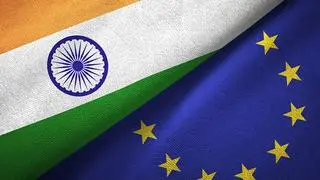India and the UK will work on an ‘enhanced trade partnership’ which could lead to a future Free Trade Agreement (FTA), according to a decision taken at a meeting of the Joint Economic and Trade Committee on Friday .
The UK’s International Trade Secretary Liz Truss and Commerce & Industry Minister Piyush Goyal, who attended the JETCO meeting, agreed to explore opportunities for expanding and deepening our trade relationship, an official release of the British High Commission, New Delhi, stated.
“This will include an ‘enhanced trade partnership’ as the first step on a wider roadmap for a deeper trade partnership, and subject to progress could lead to a future FTA,” the release said.
The proposal for working on a limited trade pact or a preferential trade agreement had initially been made by India as a full-fledged FTA takes a long time to fructify. In fact, the proposed Broad-based Trade and Investment agreement between India and the EU (of which the UK was a part before its decision to quit the bloc) is still nowhere near completion despite 13 years of intermittent negotiations.
Bilateral trade
Trade between the UK and India was worth £24 billion last year alone, and India is now the second largest investor in the UK economy. The UK’s International Trade Minister Ranil Jayawardena also raised the ambition to remove barriers for businesses across a range of sectors including food and drink, healthcare and life sciences, IT and data, chemicals and services, the release said.
The UK’s new Global Tariff UKGT schedule serves as a ‘building block’ towards an increasingly open trade partnership and could boost trade flows by reducing tariffs on Indian exports by up to £40 million per year, the release stated.
“Alongside this, UK companies have secured recognition and registration of polyhalite, a multi-nutrient fertiliser mined in the UK, which will enable UK exports and help Indian farmers to increase crop yields while supporting a cleaner, greener and sustainable environment. Increasing investment in each other’s markets is more important than ever as both economies seek to recover from the impact of Covid-19,” it added.








Comments
Comments have to be in English, and in full sentences. They cannot be abusive or personal. Please abide by our community guidelines for posting your comments.
We have migrated to a new commenting platform. If you are already a registered user of TheHindu Businessline and logged in, you may continue to engage with our articles. If you do not have an account please register and login to post comments. Users can access their older comments by logging into their accounts on Vuukle.